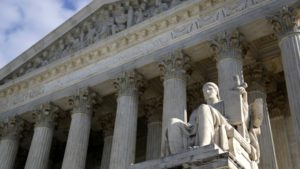The United States Supreme Court on Monday accepted three cases to decide whether a federal law prohibiting discrimination because of “sex” includes sexual orientation and gender identity, setting the stage for a new round of tension between fundamentalist Christianity and LGBTQ rights.
Two of the cases, expected to be heard in the middle of the 2020 election season, allege discrimination based on sexual orientation. The other involves a former funeral director fired in 2013 after coming out as transgender.
 A leader in the Association of Welcoming and Affirming Baptists and 75 other individuals joined groups including Americans United for Separation of Church and State in a 2017 friend-of-the-court brief arguing the for-profit mortuary violated Title VII of the Civil Rights Act of 1964, which bars job discrimination based on an individual’s race, color, religion, sex or national origin.
A leader in the Association of Welcoming and Affirming Baptists and 75 other individuals joined groups including Americans United for Separation of Church and State in a 2017 friend-of-the-court brief arguing the for-profit mortuary violated Title VII of the Civil Rights Act of 1964, which bars job discrimination based on an individual’s race, color, religion, sex or national origin.
“The Supreme Court should make it abundantly clear that no one’s rights in America hinge on someone else’s religious views,” Americans United president and CEO Rachel Laser said in a press release.
John Bursch, a vice president of the conservative legal group Alliance Defending Freedom, said redefining the word “sex” in federal law to mean “gender identity” would have widespread consequences.
“Businesses have the right to rely on what the law is — not what government agencies want it to be — when they create and enforce employment policies,” Bursch said. “The funeral home wants to serve families mourning the loss of a loved one, but the EEOC has elevated its political goals above the interests of the grieving people that the funeral home serves.”
Sarah Warbelow, legal director of the Human Rights Campaign, said the decision “will have very real consequences for millions of LGBTQ people across the country.”
“The growing legal consensus is that our nation’s civil rights laws do protect LGBTQ people against discrimination under sex nondiscrimination laws,” Warbelow said. “The Supreme Court has an opportunity to clarify this area of law to ensure protections for LGBTQ people in many important areas of life.”

Rachel Laser
Laser, who was raised a Reform Jew, said much of the bias against sexual minorities in the U.S. “is rooted in fundamentalist views of religion.”
“In order for America to live up to its promise of liberty, equality and church-state separation, we must not allow religious freedom to be weaponized to license harm to others,” she said. “Through these cases, the Supreme Court has an opportunity to make it clear that LGBTQ Americans cannot be mistreated because their existence offends some people’s religious beliefs.”
The cases are being viewed as a major test of the Supreme Court’s new conservative majority. They are the first involving LGBTQ rights since the 2018 retirement of Justice Anthony Kennedy, a crucial swing vote who wrote the majority opinion in the landmark 2015 Supreme Court 5-4 decision recognizing same-sex marriage in all 50 states.
Albert Mohler, president of Southern Baptist Theological Seminary in Louisville, Kentucky, called the cases “an effort to use the coercive power of the federal government in the furtherance of a sexual and moral revolution.”
Previous story:
AWAB leader among clergy, groups, speaking up for fired transgender mortician
